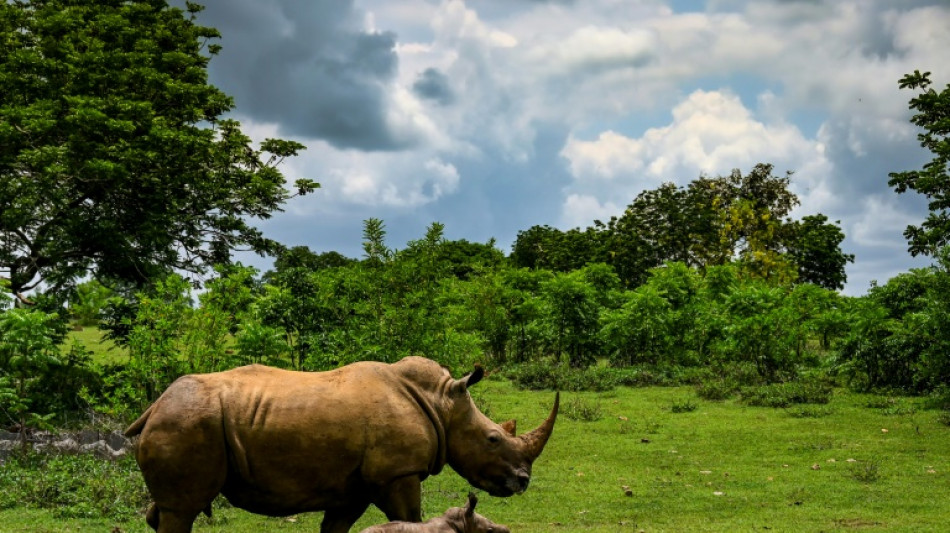

Poaching, horn trade declining but rhinos still threatened
Poaching and the illegal trade in horns have fallen in recent years but remain grave threats for the rhino's survival, the International Union for Conservation of Nature (IUCN) said Monday.
The Switzerland-based body said 2,707 rhinos were poached in Africa between 2018 and 2021, of which 90 percent were killed in South Africa, mainly in the Kruger National Park.
South Africa is home to nearly 80 percent of the world's rhinos.
"Rhino poaching rates in Africa have continued to decline from a peak of 5.3 percent of the total population in 2015 to 2.3 percent in 2021," it said in a report.
"The overall decline in poaching of rhinos is encouraging, yet this remains an acute threat to the survival of these iconic animals," said Sam Ferreira, Scientific Officer with the IUCN SSC African Rhino Specialist Group.
The IUCN said 2020 was an abnormal year for rhino poaching with Covid confinement and curbs on trade and movement.
"Global lockdowns and restrictions due to the Covid-19 pandemic saw several African countries experience dramatically reduced poaching rates in 2020 compared to previous years.
"South Africa lost 394 rhinos to poaching in 2020, while Kenya recorded no rhino poaching that year. However, as COVID-19 travel restrictions lifted, some range states reported new increases in poaching activities – for example, South Africa reported 451 and Kenya six poached rhinos in 2021," it said.
"These numbers are still significantly lower than during the peak in 2015, when South Africa alone lost 1175 rhinos to poaching."
The population of rhinos in Africa has fallen by 1.6 percent annually, from 23,562 in 2018 to 22,137 at the end of last year.
IUCN said the number of white rhinos -- which it classifies as vulnerable on its Red List of Threatened Species -- declined by almost 12 percent from 18,067 to 15,942 during this period.
However, the number of black rhinos -- deemed critically endangered by the body -- rose by 12 percent to 6,195.
"To support the growth of rhino numbers, it is essential to continue active population management and anti-poaching activities for all subspecies across different range states," the IUCN said.
Alongside the decline in poaching, data analysed for range and consumer states suggests that, on average, between 575 and 923 rhino horns entered illegal trade markets each year between 2018 and 2020, compared to approximately 2,378 per year between 2016 and 2017.
- 2020 an 'abnormal' year -
However, in 2019, before the COVID-19 outbreak, the reported seized weight of illegal rhino specimens reached its highest point of the decade, perhaps due to increased regulations and law enforcement efforts.
"2020 did represent an abnormal year with low levels of reported illegal activity, law enforcement, and government reporting," said Sabri Zain, TRAFFIC Director of Policy.
IUCN said the numbers of the one-horned rhino, found mainly in India and Nepal, and the critically endangered Javan rhino had increased since 2017.
"Thanks to conservation efforts including strengthened law enforcement, the number of greater one-horned rhinos in India and Nepal increased from an estimated 3,588 in 2018 to 4,014 at the end of 2021, while the total population of Javan rhinos increased from between 65 and 68 individuals in 2018 to 76 at the end of 2021," it said.
But the number of Sumatran rhinos fell to an estimated 34 from 47 in 2021, compared with 40 to 78 individuals in 2018.
The IUCN classifies the Sumatran rhino, the smallest of all rhino species, as critically endangered.
The World Wide Fund for Nature estimates fewer than 80 Sumatran rhinos remain in the world, mainly on the Indonesian island of Sumatra and Borneo.
The IUCN report said 11 rhino poaching incidents were recorded in Asia -- 10 in India and one in Nepal -- since the beginning of 2018, all of which involved greater one-horned rhinos.
"Detection of carcasses in dense rainforests remains a challenge, and there were no reports of illegal killings of Sumatran rhinos despite the substantial population declines recorded," it added.
H.Gallo--IM



